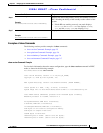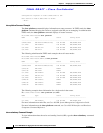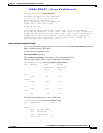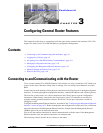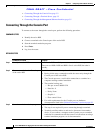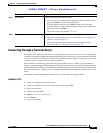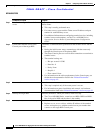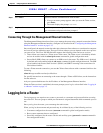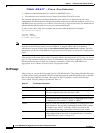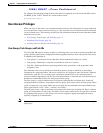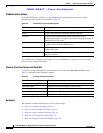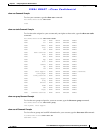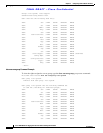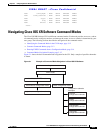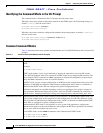
FINAL DRAFT —Cisco Confidential
3-5
Cisco ASR 9000 Series Aggregation Services Router Getting Started Guide
OL-17502-01
Chapter 3 Configuring General Router Features
Logging In to a Router
Connecting Through the Management Ethernet Interface
The Management Ethernet interface allows you to manage the router using a network connection. Before
using the Management Ethernet interface, configure it as described in the
“Configuring the Management
Ethernet Interface” section on page 3-35.
Once configured, the network connection takes place between client software on a workstation computer
and a server process within the router. The type of client software you use depends on the server process
you want to use. The Cisco
IOS XR Software supports the following client and server services:
• Telnet clients can connect to a Telnet server in the router. The Telnet server is disabled by default
and can be enabled with the telnet ipv4 server command in global configuration mode.
• Secure Shell (SSH) clients can connect to an SSH server in the router. The SSH server is disabled
by default and can be enabled with the ssh server command in global configuration mode. The SSH
server handles both Secure Shell Version 1 (SSHv1) and SSHv2 incoming client connections for
IPv4 address families.
To start a Telnet network connection, you start the Telnet client software with a command similar to the
following:
telnet ManagementEthernetInterfaceIPaddress
For specific instructions on connecting to the router through a Telnet or SSH client, see the instructions
for that software.
Ask your system administrator for the IP address of the Management Ethernet interface.
When the Telnet session is established, the router prompts you to log in, as described in the “Logging In
to a Router” section on page 3-5.
Logging In to a Router
The login process can require users to enter a password or a username and password before accessing
the router CLI. The user groups to which your username is assigned determine which commands you can
use.
Once you log in to the router, you can manage the entire router.
When you log in, the username and password may be validated by any of the following services:
• Usernames configured on the router (username command in global configuration mode)
• Root-system usernames that are configured
• Passwords configured for the router console and auxiliary ports (password or secret command in
line configuration mode)
Step 6
Press Enter. (Optional) Initiates communications with the RSP.
• If no text or router prompt appears when you start the Telnet session,
press Enter.
• The router displays the prompt: Username:
Step 7
Log in to the router. Establishes your access rights for the router management session.
Type a username and password when prompted.
Command or Action Purpose



